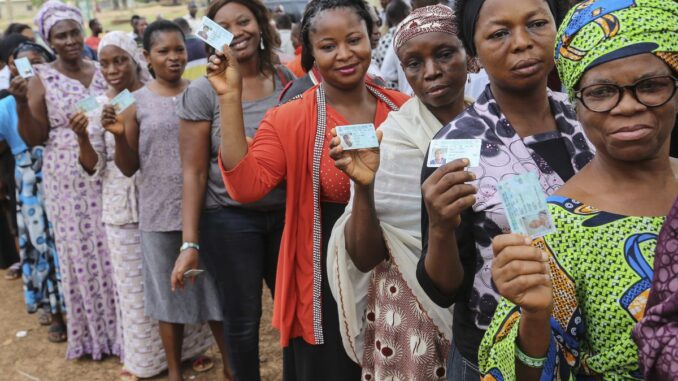
The increasing awareness and desire of many Nigerians to partake in the forthcoming 2023 general elections, and by so doing, in the democratic process deserves maximum encouragement by all relevant agencies and non-governmental organisations. For one, the awareness may signpost a marked departure from political complacency that seems to have been enthroned among the populace for many reasons. And for another, it may mark the beginning of a revolution for a deepened democracy with its appurtenances of people-oriented dividends. Against this backdrop, the Independent National Electoral Commission (INEC) is on the right path to have extended the ongoing Continuous Voter Registration (CVR) exercise indefinitely, until, in the words of its spokesperson, all eligible Nigerians are registered.
Like revolution, elections in a democracy, are the festivities of the masses, the repository of popular sovereignty. Their ability to exercise or partake in this festival is essential to the core of democracy whether popular or liberal democracy. The latter particularly emphasises the importance of the franchise to the electorate; their ability to vote and be voted for. In advanced democracy, this is taken for granted as the individual’s national identity card alone, an omnibus data bank, empowers the citizen to vote, especially when his age is right for voting. This has remained a permanent problem to the electoral management bodies in the developing world burdened with sundry logistics problems, such as sorting the electoral roll for the public to see, printing of ballot papers, acquiring of card readers and calibrating them for voting exercises. This is by no means an easy task in an environment where the political elite are undisciplined and see electoral process as a sort war. Therefore, Continuous Voter Registration (CVR) presents its problem to the electoral body, especially its ability to overcome some of the aforementioned logistic problems; and as a result, deadlines are required to achieve some precision in the rather complex electoral process that is equally bedeviled by judicial impediments hallmarked by election twilight litigations.
As it happened, mainly due to the misgovernance of the incumbent elite and their predecessors, there is growing awareness on the part of the electorate to liberate themselves from the shackles of elite misrule by the sheer exercise of their franchise to demonstrate that they are the boss of democracy and redirect the political direction of the polity. Somehow, this awareness has unlocked the desire of the voters to register, and they have had to complain about the deadline to close the CVR for a while to allow for proper clean up of the electoral register ahead of the 2023 general elections. Across the country, there is a marveling desire on the part of the electorate to register and be able to vote. The inability to do so by many has resulted in a deluge of complaints. Some have blamed officials of the Independent National Electoral Commission (INEC) of incapacity to cope as well as ulterior motive to disenfranchise the citizens. It has gotten to a head that some organisations are making the possession of a voter’s card as condition for admission into their activities. Others, such as the Socio-Economic Rights and Accountability Project (SERAP) and some displaced Nigerians, have even gone to court to challenge the INEC. The frustration of the electorate is compounded by the technical hitches that occurred in some of the registration centres in the country.
We dare say that permanent voter card (PVC) is not compulsory. However, voter registration should always accommodate the needs of the voters while acknowledging the fact that it is a continuous exercise beyond the momentary suspension to allow for sorting ahead of the 2023 elections. It is well that INEC has responded to the situation by directing its electoral officers to continue with its Continuous Voter Registration nationwide. According to its spokesperson, Festus Okoye, “The Continuous Voter Registration (CVR) will continue nationwide, and all the Resident Electoral Commissioners and Electoral Officers have been directed to continue with the exercise pending further directives from the Commission. The Commission has since consistently reiterated its resolve to continue to provide electoral services to the Nigerian people and register all eligible Nigerians that are interested in registering. The Commission has yet again deployed additional machines to areas of pressure and pledged to continue to serve the people of Nigeria. With about 11 million new voters being added to the 2019 tally of 84,004,084 as at June, the race to 2023 is turning out to be interesting.
The commission’s offer of a fresh window of opportunities for prospective voters to avoid mass disenfranchisement is commendable; and every eligible voter should exploit the available window to do the needful. INEC should consider the use of the registration printout once the biometrics that includes fingerprints of a potential voter is captured in lieu of the PVC. The beauty of democracy does not lie in the voting at the polling booths only but also in the process. So the extension offers some value to the credibility of the process. The growing voter awareness in the country today appears to have answered a key question in democracy audit posed by David Beetham, that is: “to what extent do people have confidence in the ability of the political systems to solve the main problems confronting society, and in their ability to influence it?” This is why we commend the electorate for their sense of civic responsibility. Perhaps this is Nigerians’ own way of disciplining democracy. In other words, this will help improve the quality of the country’s democracy, beleaguered since its inception in 1999 by elite malfeasance. After all, democracy is about commitment to the ideals of participation and representation.
END

Be the first to comment